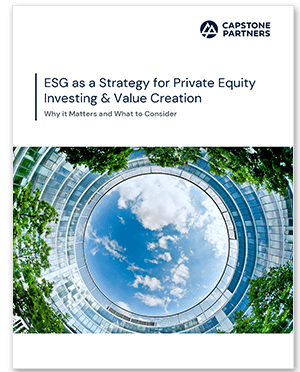Environmental, Social, & Governance as a Strategy for Private Equity Investing & Value Creation
 ESG Integration Helps Achieve Long-Term Value Creation
ESG Integration Helps Achieve Long-Term Value Creation
Capstone Partners released its white paper exploring how private equity firms can leverage Environmental, Social, and Governance (ESG) frameworks within their portfolio companies to enhance and create value from inception to exit. ESG initiatives in and of themselves do not make a poorly performing company profitable. However, when properly applied, ESG frameworks are a non-traditional financial analysis and engineering tool that can materially strengthen the fabric, flexibility, efficiency, and long-term growth potential of an organization and drive enhanced economic shareholder value. The paper explores the multifaceted definition of ESG, why the topic is relevant for every firm to consider, hurdles and upcoming changes the industry will likely face, and how to approach ESG integration. Despite its connotations, ESG is not a synonym for altruism, but rather, it is a strategy for optimizing a business and investor returns.
Let’s call ESG exactly what it is: a playbook that systematically makes a business better. A better employer. A better risk manager. A better custodian of customer and patient data. A better steward of our environment. A firm that is more rooted in its market and community by creating better economic opportunities for every stakeholder.
ESG measures are an effective prism through which every firm’s management and investment strategy should be viewed to strengthen its competitive advantages, reduce regulatory and litigation risks, attract top talent, and increase operational efficiencies. Furthermore, by implementing ESG initiatives, public, private, and private equity-backed companies can be better positioned to differentiate themselves to attract capital and maximize their value in a liquidity event. Buyers are becoming increasingly attuned to the importance of ESG as a tool to mitigate risk and identify areas of growth and innovation. Because of this, assessing a target’s ESG-related value and risks has become increasingly standard in corporate and merger and acquisition (M&A) due diligence. In this light, considering the full ecosystem that a company touches, there is collinearity in ESG and financial performance, where ESG integration helps to achieve long-term value creation.
The paper includes exclusive interviews with President and COO, Julia Karol, and Principal Anabelle Skalleberg of Boston-based private equity firm The Watermill Group; Lauren Winkler of ESG and investor communications program provider Library Ave Consulting; and Elenore Garton, Ph.D., Co-Founder and CEO of ESG and impact analytics software provider Tablecloth. Collectively, these individuals provide unique perspectives on strategies, tips, and tools which private equity firms and business owners can utilize for successful ESG integration.
Also included in this report:
- Why ESG-focused assets under management are accounting for a growing share of committed capital.
- Capstone’s view on ESG in the Culture Wars.
- Industry-specific insights on recurring ESG considerations seen by Capstone’s Investment Banking Teams.
- Case studies on how leading private equity firms are pioneering ESG investment strategies.
- A guide to launching an ESG integration program, including six steps for implementing a successful ESG framework.
Insights for Middle Market Leaders
Receive email updates with our proprietary data, reports, and insights as they’re published for the industries that matter to you most.
